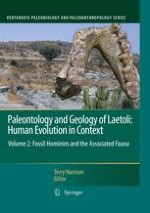2011 | OriginalPaper | Buchkapitel
3. The Lower Third Premolar of Serengetilagus praecapensis (Mammalia: Lagomorpha: Leporidae) from Laetoli, Tanzania
verfasst von : Alisa J. Winkler, Yukimitsu Tomida
Erschienen in: Paleontology and Geology of Laetoli: Human Evolution in Context
Verlag: Springer Netherlands
Aktivieren Sie unsere intelligente Suche, um passende Fachinhalte oder Patente zu finden.
Wählen Sie Textabschnitte aus um mit Künstlicher Intelligenz passenden Patente zu finden. powered by
Markieren Sie Textabschnitte, um KI-gestützt weitere passende Inhalte zu finden. powered by
